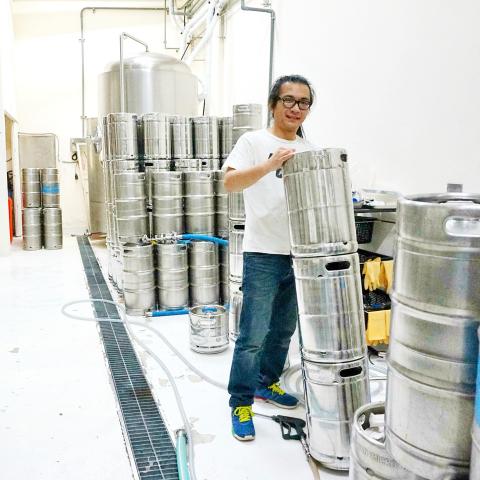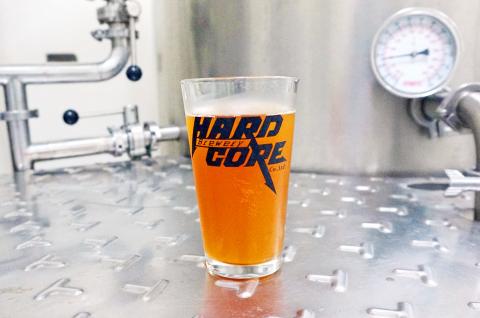For Nickolas Chen (陳銘德), coming up with a name for his brewery wasn’t too difficult. The former programmer for IBM has three guitars stashed on the top floor of his brewery in New Taipei City’s Sinjhuang District (新莊區), which he and his band use as a place to jam.
Chen, whose long hair is tied up in a ponytail in true rocker fashion, decided on the name Hardcore Brewery four years ago because he wished to conjure up a taste of the music genre, hardcore punk, in his brews.
“We wanted people to hear the name and think that what we’re doing — brewing craft beer in Taiwan — is totally crazy and badass,” Chen tells me.

Photo: Dana Ter, Taipei Times
We meet outside the brewery which is surrounded by mechanics and shops selling used car parts. Strict brewing laws in Taiwan confine breweries to industrial areas. Inside is narrow and compact — mash tanks and kettles on the first floor, malts and hops storage on the second floor and an office space on the top floor.
Unlike Jim & Dad’s and 55th Street, both of which have more classic brewery logos — minimalistic designs with artsy fonts — I notice on the name card that Hardcore Brewery’s logo has two lightning bolts.
LIKE COOKING STEAK

Photo: Dana Ter, Taipei Times
Chen is the type of person who stands out from the crowd. In fact, he was one of the first local brewers to help launch the second wave of craft breweries in Taiwan. The first wave, which took place in the early 2000s tanked quickly as consumers simply weren’t ready for expensive craft beer. Fast forward 10 years, and Taiwanese were well-traveled and had more disposable income.
Though he always loved drinking beer, Chen often wondered why beer is seen as a cheap beverage that you buy from a convenience store. He reasoned that a lot of people would rather drink Heineken or Taiwan Beer because they are inexpensive and well-promoted.
“We have a cheap drinking culture,” Chen quips.
In 2011, out of curiosity, Chen enrolled in homebrewing classes at a warehouse owned by Mommouth Cafe (媽媽嘴咖啡) in New Taipei City’s Bali District (八里). He completed a course in extracting dry malts and another in steeping grains. At the time, Mommouth was the only place in Taiwan that provided homebrewing lessons. Today, there are about five others, including Hobrew (傢釀生活) and iBrew (愛釀啤酒坊).
“I was surprised at how easy it is to make beer, but how difficult it is to make beer that tastes good,” Chen says.
“It’s like cooking steak — anyone can make steak but you have to be really careful with how you make it or else it’ll turn up underdone or really burnt,” he adds.
By the time Chen finished his course, there were more local brewers entering the scene. He befriended a couple of them and they started sharing tips and techniques on homebrewing through Facebook. That’s when they decided to create a Facebook group, HomeBrew Maniacs (自釀啤酒狂熱份子俱樂部), and invite other homebrewers in Taiwan, both local and expat, to join. The group still exists today, though many members — 23 Brewing, Jim & Dad’s and Taiwan Head Brewers — have gone on to set up their own breweries.
‘DIRTY, DANGEROUS AND DEMEANING’
Chen says it took a lot of hard work to get Hardcore Brewery off the ground. Unlike a few of his peers who also opened breweries, Chen did not have a lot of money. He jokes that initially, working in the brewery felt like doing a “3D job,” which is a term borrowed from Japanese to describe jobs that are “dirty, dangerous and demeaning.”
In 2013, Hardcore Brewery released their first brew, the Hop Apostle. An American Pale Ale (APA) with 5.8 percent alcohol, the Hop Apostle is made with American hops and five types of malt. It is tastefully bitter with a refreshing and smooth finish.
For the following two years, they participated in BeerFes Taipei (精釀啤酒嘉年華), a yearly homebrewing competition which takes place at Huashan 1914 (華山1914文化創意產業園區). Chen says it’s competitions like these that help spread the word of craft beer and encourage local consumers to try it.
Chen is happy that more Taiwanese are drinking craft beer and that it’s more readily available in bars and pubs.
“A few years ago, if you wanted craft beer, you had to brew your own or call up friends who are brewers and ask them if they have any beer left,” Chen says. “Now you can just walk into a bar and order it.”
Chen says he still enjoys inviting friends over to the brewery and kicking back with a couple of pints of Hop Apostle and Hardcore’s other brew, the Suuuuuuummer Slam (夏景乍現). A hefeweizen, or German wheat beer with 5.8 percent alcohol, it boasts a light sweetness with a silky finish.
“It’s too easy,” Chen says. “One pint in and I’ll start calling my friends to invite them over and we’ll be drinking all day.”
Warning: Excessive consumption of alcohol can damage your health.

On April 26, The Lancet published a letter from two doctors at Taichung-based China Medical University Hospital (CMUH) warning that “Taiwan’s Health Care System is on the Brink of Collapse.” The authors said that “Years of policy inaction and mismanagement of resources have led to the National Health Insurance system operating under unsustainable conditions.” The pushback was immediate. Errors in the paper were quickly identified and publicized, to discredit the authors (the hospital apologized). CNA reported that CMUH said the letter described Taiwan in 2021 as having 62 nurses per 10,000 people, when the correct number was 78 nurses per 10,000

May 5 to May 11 What started out as friction between Taiwanese students at Taichung First High School and a Japanese head cook escalated dramatically over the first two weeks of May 1927. It began on April 30 when the cook’s wife knew that lotus starch used in that night’s dinner had rat feces in it, but failed to inform staff until the meal was already prepared. The students believed that her silence was intentional, and filed a complaint. The school’s Japanese administrators sided with the cook’s family, dismissing the students as troublemakers and clamping down on their freedoms — with

As Donald Trump’s executive order in March led to the shuttering of Voice of America (VOA) — the global broadcaster whose roots date back to the fight against Nazi propaganda — he quickly attracted support from figures not used to aligning themselves with any US administration. Trump had ordered the US Agency for Global Media, the federal agency that funds VOA and other groups promoting independent journalism overseas, to be “eliminated to the maximum extent consistent with applicable law.” The decision suddenly halted programming in 49 languages to more than 425 million people. In Moscow, Margarita Simonyan, the hardline editor-in-chief of the

Six weeks before I embarked on a research mission in Kyoto, I was sitting alone at a bar counter in Melbourne. Next to me, a woman was bragging loudly to a friend: She, too, was heading to Kyoto, I quickly discerned. Except her trip was in four months. And she’d just pulled an all-nighter booking restaurant reservations. As I snooped on the conversation, I broke out in a sweat, panicking because I’d yet to secure a single table. Then I remembered: Eating well in Japan is absolutely not something to lose sleep over. It’s true that the best-known institutions book up faster